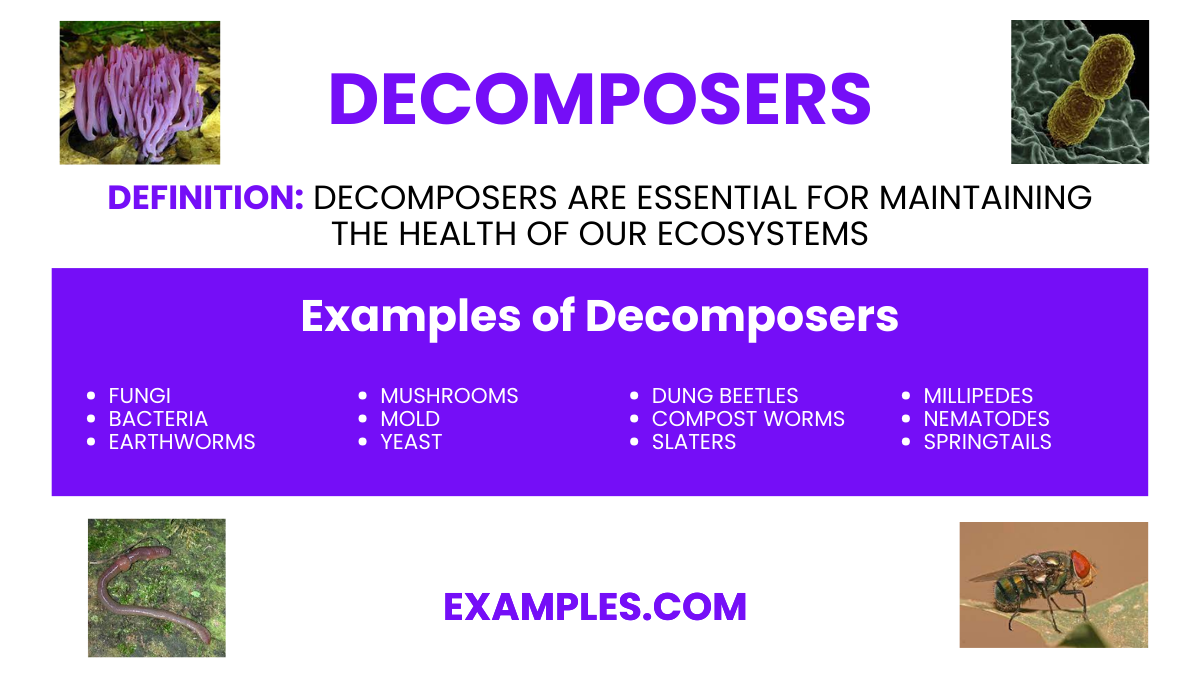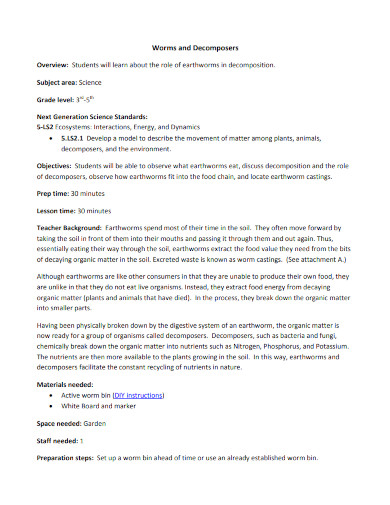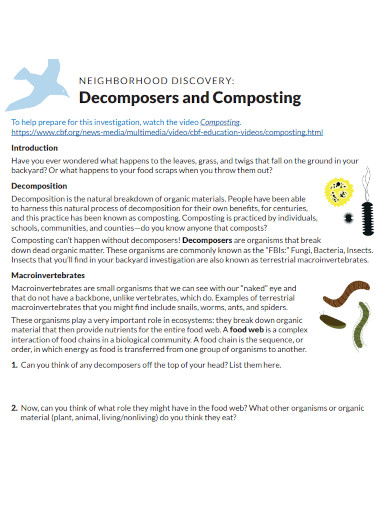What is the primary role of decomposers in an ecosystem?
Producing oxygen
Consuming primary producers
Breaking down dead organic matter
Pollinating plants


Decomposers play a crucial role in ecosystems by breaking down dead organisms and waste, recycling nutrients back into the environment. This guide explores the fascinating world of decomposers, from fungi and bacteria to earthworms, providing clear examples of how these organisms contribute to soil health and the cycle of life. Teachers and students will gain a deeper understanding of decomposition’s vital process and its importance in maintaining ecological balance. There are many intricate organic relationships one can observe and connect within the context of an ecosystem. One of the most pivotal organisms that exist in the lowest level of the food web is the decomposers.
Decomposers are organisms that compose one-third of the biotic factors in a given environment or ecosystem. They are part of the lowest trophic level and will affect some of the abiotic factors in their native environment.
One of the best examples of decomposers are fungi. Fungi break down organic matter by releasing enzymes, decomposing dead plants and animals into simpler molecules, thus enriching the soil and making nutrients available to other organisms.
Decomposers are essential for maintaining the health of our ecosystems. They break down dead material, returning nutrients to the soil, which supports new plant growth and sustains the food web. By understanding the role of different decomposers, students can appreciate the complexity and importance of biodiversity in ecosystems. Here are 20 unique examples of decomposers, each playing a vital role in recycling organic matter.
Decomposers are nature’s recyclers, playing a pivotal role in breaking down dead or decaying organic matter and returning nutrients to the ecosystem. These organisms are critical for soil health and the continuation of life by ensuring that nothing goes to waste. Here, we explore the various types of decomposers, highlighting their unique roles and providing examples to help teachers illustrate these concepts to students.
Fungi are among the most efficient decomposers, breaking down the tough cellulose and lignin in plant materials. Mushrooms, mold, and yeast are common examples, each playing a role in decomposing organic matter, from fallen logs to leftovers in your fridge.
Bacteria are microscopic decomposers that play a fundamental role in the nutrient cycle. They break down a wide range of organic materials, including plant and animal matter, into simpler substances that can be reused by living organisms in the ecosystem.
Detritivores are organisms that consume decaying organic matter, contributing to the decomposition process. Earthworms, woodlice, and dung beetles are examples, physically breaking down matter and speeding up decomposition by increasing the surface area for bacteria and fungi to act upon.
Scavengers play a crucial role in the early stages of decomposition by consuming dead animals. While not decomposers in the strict sense, animals like vultures, hyenas, and crows help break down carcasses, making it easier for other decomposers to complete the process.
Decomposers, including fungi, bacteria, and certain invertebrates, play a pivotal role in ecosystems by breaking down dead organisms and organic waste. This process recycles nutrients back into the soil, supporting plant growth and maintaining the balance of natural cycles. Decomposers also help in controlling disease by decomposing dead matter, which could otherwise harbor pathogens. By understanding the functions of decomposers, students can appreciate their indispensable role in sustaining life on Earth.


Fertilizers are very useful commodities that can enhance the quality of the soil plants are planted on. One can create fertilizers through the fermentation process of bacteria as they will digest organic matter.
Begin by obtaining a large sack or container for the homemade fertilizer. Ensure that the sack or container can be properly sealed and can prevent sunlight from entering as outside exposure can destroy the product.
When you have obtained the large sack or container, you must now fill it with soil and other decomposable organic matter. Note that the amount of organic matter and soil you use will require proportional amounts of decomposers.
Bacteria are one of the types of decomposers that one can easily obtain from a general goods store. Lactobacillus is a type of good bacteria that is can be very helpful when ingested by humans, which are primarily found in yogurt and yogurt-related products. This bacteria has also many uses outside of our gut, you will need to introduce lactobacillus into the organic matter by using three to four small bottles of yogurt. Be sure that the yogurt you use has a lot of lactobacillus in it. (i.e. Yakult)
Water is required by the lactobacillus to survive, so be sure to add one to two liters of water into the container. The bigger the container the more water is required for the whole community.
When using bacteria as a primary decomposer of the fertilizer, you must ensure that the storage is tightly sealed and stored in a dark place. Note the container will heat up due to the decomposition process of bacteria releasing thermal energy.
Decomposers break down dead organisms and waste materials into simpler substances, recycling nutrients back into the ecosystem, essential for soil health and new life growth.
Decomposers, like fungi and bacteria, secrete enzymes that break down organic matter externally. They then absorb the released nutrients directly through their cell walls or membranes
Decomposers compose the lowest part of the food chain or food web. This is because they have a specific function wherein they decompose organic matter into base nutrients that will be supplied to the producers of the food chain or food web. The decomposers ensure that the food chain or food web will have an efficient energy cycle that will cover all the bases and stages of the whole thing. Without the decomposers, the soil where the plants and trees grow will have insufficient nutrients, which will inhibit the growth of all the plants in the whole biosphere. In conclusion, decomposers are an essential part of the food chain or food web as everything hinges on these organisms to decompose organic matter into raw nutrients and energy.
Climate change has a lot of effects that can contribute to large changes in the natural environment of the Earth. Decomposers have an intricate relationship with the environment as one of their objectives and goals in a community is to provide nutrients to the surrounding area. Due to global warming, specific biomasses will decompose faster, and the metabolic rate will increase, which will cause an imbalance in the nutrients and litter the decomposers to add to the soil around them. This will alter some of the presence of decomposers in a given area which might shift the ecological balance of said location.
Decomposers are organisms that are present in the lowest part of the food chain. These organisms decompose living and organic matter into more base nutrients for the flora to use and grow. Because of the decomposition process, these organisms are pivotal to the survival of all the organisms in a given ecosystem.
Text prompt
Add Tone
20 Decomposers Examples
Types of Decomposers
What is the primary role of decomposers in an ecosystem?
Producing oxygen
Consuming primary producers
Breaking down dead organic matter
Pollinating plants
Which of the following organisms is a decomposer?
Earthworm
Eagle
Cow
Lion
Fungi are important decomposers because they:
Produce oxygen
Perform photosynthesis
Break down complex organic materials
Create new habitats
What do decomposers release back into the soil?
Carbon dioxide
Nutrients
Light
Water
Which of the following is NOT a decomposer?
Bacteria
Fungi
Snail
Butterfly
How do decomposers contribute to the carbon cycle?
By absorbing carbon dioxide
By converting carbon into fossil fuels
By breaking down dead organisms and releasing carbon dioxide
By fixing carbon into the soil
Which decomposer is known for breaking down wood?
Earthworm
Termite
Grasshopper
Sparrow
Why are bacteria considered efficient decomposers?
They have large sizes
They reproduce slowly
They can decompose a wide variety of organic materials
They only decompose plant material
Decomposers are most active in which part of the ecosystem?
Desert
Forest floor
Open ocean
Mountain tops
Which of the following is an example of a detritivore?
Eagle
Earthworm
Shark
Frog
Before you leave, take our quick quiz to enhance your learning!

